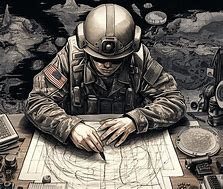Military and intelligence
One role for psychologists in the military has been to evaluate and counsel soldiers and other personnel. In the U.S., this function began during World War I, when Robert Yerkes established the School of Military Psychology at Fort Oglethorpe in Georgia. The school provided psychological training for military staff. Today, U.S. Army psychologists perform psychological screening, clinical psychotherapy, suicide prevention, and treatment for post-traumatic stress, as well as provide prevention-related services, for example, smoking cessation. The United States Army's Mental Health Advisory Teams implement psychological interventions to help combat troops experiencing mental problems.
.jpg)
Psychologists may also work on a diverse set of campaigns known broadly as psychological warfare. Psychological warfare chiefly involves the use of propaganda to influence enemy soldiers and civilians. This so-called black propaganda is designed to seem as if it originates from a source other than the Army. The CIA's MKULTRA program involved more individualized efforts at mind control, involving techniques such as hypnosis, torture, and covert involuntary administration of LSD. The U.S. military used the name Psychological Operations (PSYOP) until 2010, when these activities were reclassified as Military Information Support Operations (MISO), part of Information Operations (IO). Psychologists have sometimes been involved in assisting the interrogation and torture of suspects, staining the records of the psychologists involved.
.jpg)

.jpg)

👏🏻👏🏻
ReplyDeleteبرافو يا هندسه
ReplyDeleteVery good mohamed
ReplyDelete💪👏💟
ReplyDeleteVery good
ReplyDelete